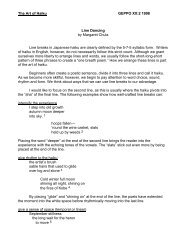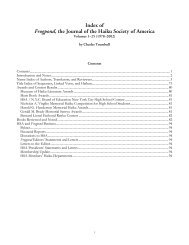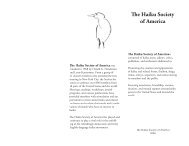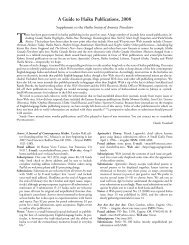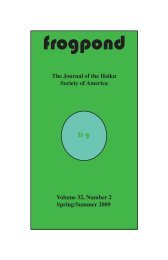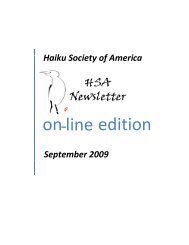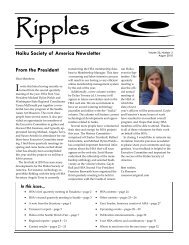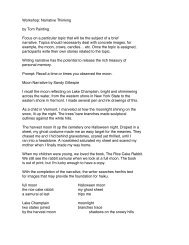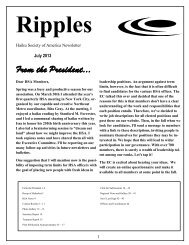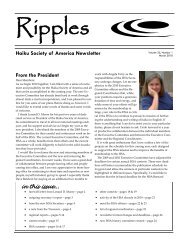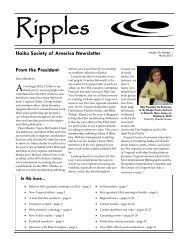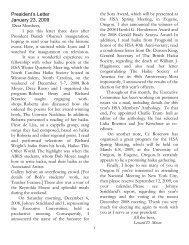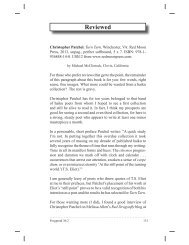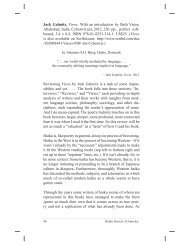Frogpond 34.3 • Autumn 2011 (pdf) - Haiku Society of America
Frogpond 34.3 • Autumn 2011 (pdf) - Haiku Society of America
Frogpond 34.3 • Autumn 2011 (pdf) - Haiku Society of America
Create successful ePaper yourself
Turn your PDF publications into a flip-book with our unique Google optimized e-Paper software.
Robert Epstein (ed.). Dreams Wander On: Contemporary<br />
Poems <strong>of</strong> Death Awareness. Baltimore, MD: Modern English<br />
Tanka Press. <strong>2011</strong>, 131 pp., perfect s<strong>of</strong>tbound, 6 x 9. ISBN<br />
978-1-935398-24-0, 18.95 USD, .<br />
by Bruce England, Santa Clara, California<br />
Robert Epstein is a psychotherapist, a widely published haiku<br />
poet, and an editor <strong>of</strong> anthologies <strong>of</strong> emotionally charged topics.<br />
The title <strong>of</strong> his new anthology, Dreams Wander On: Contemporary<br />
Poems <strong>of</strong> Death Awareness, is taken from what is<br />
generally considered Bashō’s death haiku.<br />
Sick, on a journey,<br />
Yet over withered fields<br />
Dreams wander on. 1<br />
This is the second volume in a yet to be determined number<br />
<strong>of</strong> anthologies. The first was The Breath <strong>of</strong> Surrender: A Collection<br />
<strong>of</strong> Recovery-Oriented <strong>Haiku</strong>, and Epstein is currently<br />
working on a third, The Temple Bell Stops: Contemporary Poems<br />
<strong>of</strong> Grief, Loss and Change.<br />
This anthology is a showcase for poems on death awareness.<br />
The poems are intended to be written “with awareness <strong>of</strong><br />
one’s own mortality, not someone else’s.” 2 This might suggest<br />
a similarity to Yoel H<strong>of</strong>fmann’s Japanese Death Poems. 3<br />
For the most part, these are not summary <strong>of</strong> life or farewell to<br />
life poems in the sense <strong>of</strong> traditional Japanese death poems. I<br />
would say the two books complement each other. H<strong>of</strong>fmann’s<br />
book reflects a well-established Japanese cultural tradition<br />
among monks, nobles, warriors, and haiku poets, while Epstein’s<br />
book is our own expression <strong>of</strong> what could become a<br />
tradition among English language haiku writers.<br />
As I count, there are 185 contributors and 382 poems. The list<br />
<strong>of</strong> contributors contains a good mix <strong>of</strong> well-known and not so<br />
well known haiku writers. The poems include haiku, senryu,<br />
tanka, short poems and haiga. The author wrote the preface,<br />
. . . . . . . . . . . . . . . . . . . . . . . . . . . . . . . . . . . . . . . . . . . . . . . . . . . . . . . . . . . .<br />
86 <strong>Haiku</strong> <strong>Society</strong> <strong>of</strong> <strong>America</strong>



